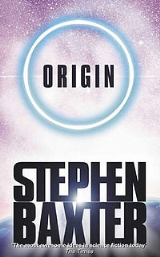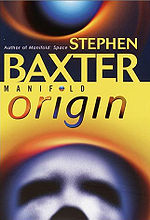
Manifold: Origin
Encyclopedia
Manifold: Origin is a science fiction
novel by author Stephen Baxter
from the Manifold Trilogy
.
This is the third installment in Stephen Baxter's Manifold trilogy. It sees Manifold regular Reid Malenfant and others once again dealing with possibilities of primate evolution in all forms and grappling with the Fermi Paradox
. This time an artifact in the sky transports a select few individuals including Malenfant's wife to a new red moon which has appeared in place of the moon we know. Blaming himself, Malenfant launches a one man mission to find his wife and solve the Fermi Paradox once and for all.
saying that "a variety of characters speculate on the simpler aspects of Darwinian theory, but somewhat disappointingly they all reach the same conclusion. Gratuitous violence from time to time offers relief from the challenge of keeping straight the host of loosely related story lines. Baxter fans should be well satisfied, but those who prefer more thought-provoking SF will need to look elsewhere." Roland Green in his review for Booklist
was much more positive saying "Baxter uses many more characters and viewpoint shifts than Arthur C. Clarke
in support of a theme that distinctly recalls Clarke’s classic Childhood's End
(1953). He also details survival in primitive societies unsparingly; as a result, much of the book is not for the weak of stomach. Lovers of intelligent variations on classic sf themes, however, will embrace this worthy successor to Manifold: Time (2000) and Manifold: Space (2001)."

Science fiction
Science fiction is a genre of fiction dealing with imaginary but more or less plausible content such as future settings, futuristic science and technology, space travel, aliens, and paranormal abilities...
novel by author Stephen Baxter
Stephen Baxter
Stephen Baxter is a prolific British hard science fiction author. He has degrees in mathematics and engineering.- Writing style :...
from the Manifold Trilogy
Manifold Trilogy
The Manifold Trilogy is a series of science fiction books by Stephen Baxter. It consists of three novels and an anthology of short stories relating to the three. The three books in the trilogy are not ordered chronologically; instead, they are thematically linked stories that take place in...
.
This is the third installment in Stephen Baxter's Manifold trilogy. It sees Manifold regular Reid Malenfant and others once again dealing with possibilities of primate evolution in all forms and grappling with the Fermi Paradox
Fermi paradox
The Fermi paradox is the apparent contradiction between high estimates of the probability of the existence of extraterrestrial civilizations and the lack of evidence for, or contact with, such civilizations....
. This time an artifact in the sky transports a select few individuals including Malenfant's wife to a new red moon which has appeared in place of the moon we know. Blaming himself, Malenfant launches a one man mission to find his wife and solve the Fermi Paradox once and for all.
Reception
Jeff Zaleski was mixed in his review for Publishers WeeklyPublishers Weekly
Publishers Weekly, aka PW, is an American weekly trade news magazine targeted at publishers, librarians, booksellers and literary agents...
saying that "a variety of characters speculate on the simpler aspects of Darwinian theory, but somewhat disappointingly they all reach the same conclusion. Gratuitous violence from time to time offers relief from the challenge of keeping straight the host of loosely related story lines. Baxter fans should be well satisfied, but those who prefer more thought-provoking SF will need to look elsewhere." Roland Green in his review for Booklist
Booklist
Booklist is a publication of the American Library Association that provides critical reviews of books and audiovisual materials for all ages. It is geared toward libraries and booksellers and is available in print or online...
was much more positive saying "Baxter uses many more characters and viewpoint shifts than Arthur C. Clarke
Arthur C. Clarke
Sir Arthur Charles Clarke, CBE, FRAS was a British science fiction author, inventor, and futurist, famous for his short stories and novels, among them 2001: A Space Odyssey, and as a host and commentator in the British television series Mysterious World. For many years, Robert A. Heinlein,...
in support of a theme that distinctly recalls Clarke’s classic Childhood's End
Childhood's End
Childhood's End is a 1953 science fiction novel by the British author Arthur C. Clarke. The story follows the peaceful alien invasion of Earth by the mysterious Overlords, whose arrival ends all war, helps form a world government, and turns the planet into a near-utopia...
(1953). He also details survival in primitive societies unsparingly; as a result, much of the book is not for the weak of stomach. Lovers of intelligent variations on classic sf themes, however, will embrace this worthy successor to Manifold: Time (2000) and Manifold: Space (2001)."


